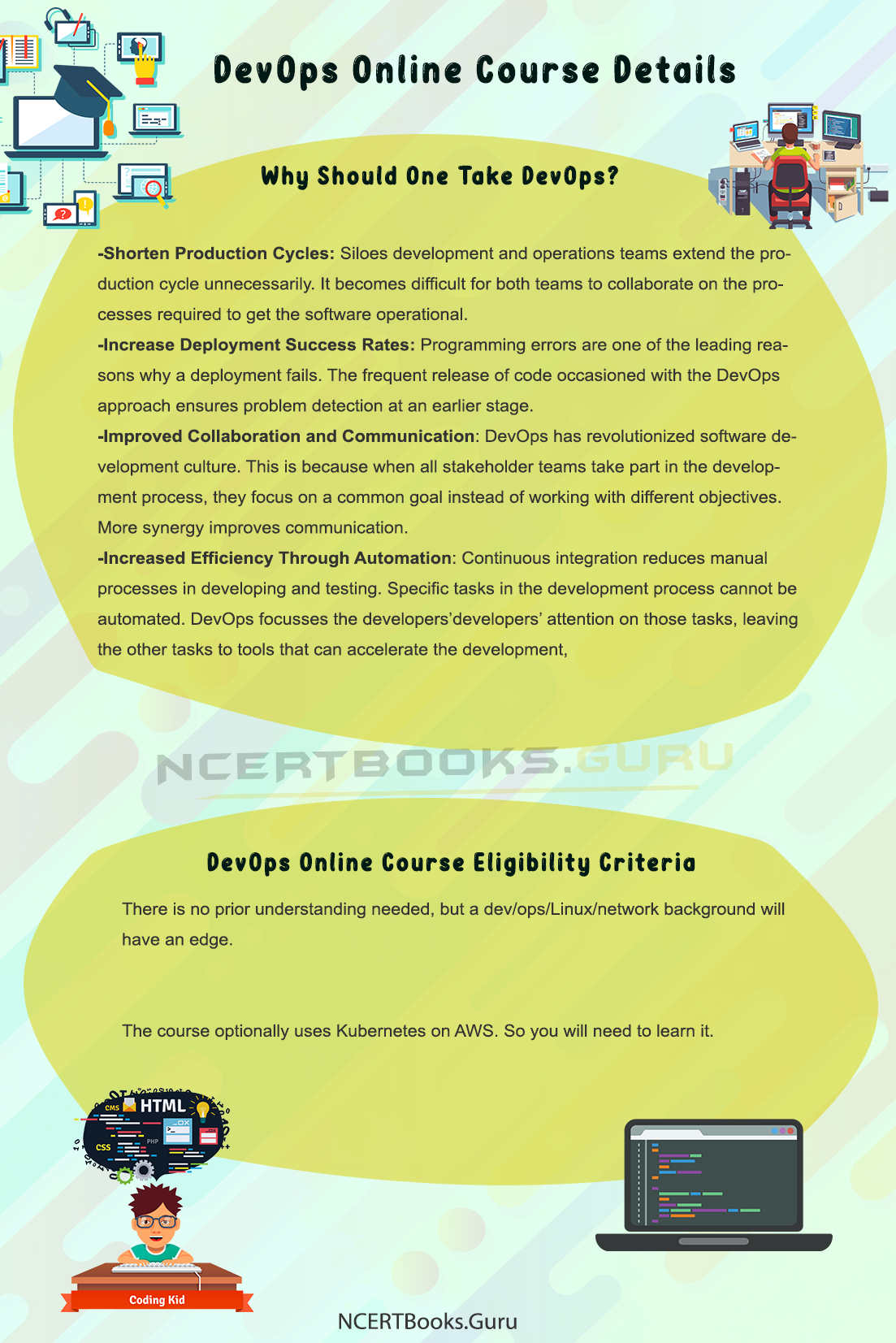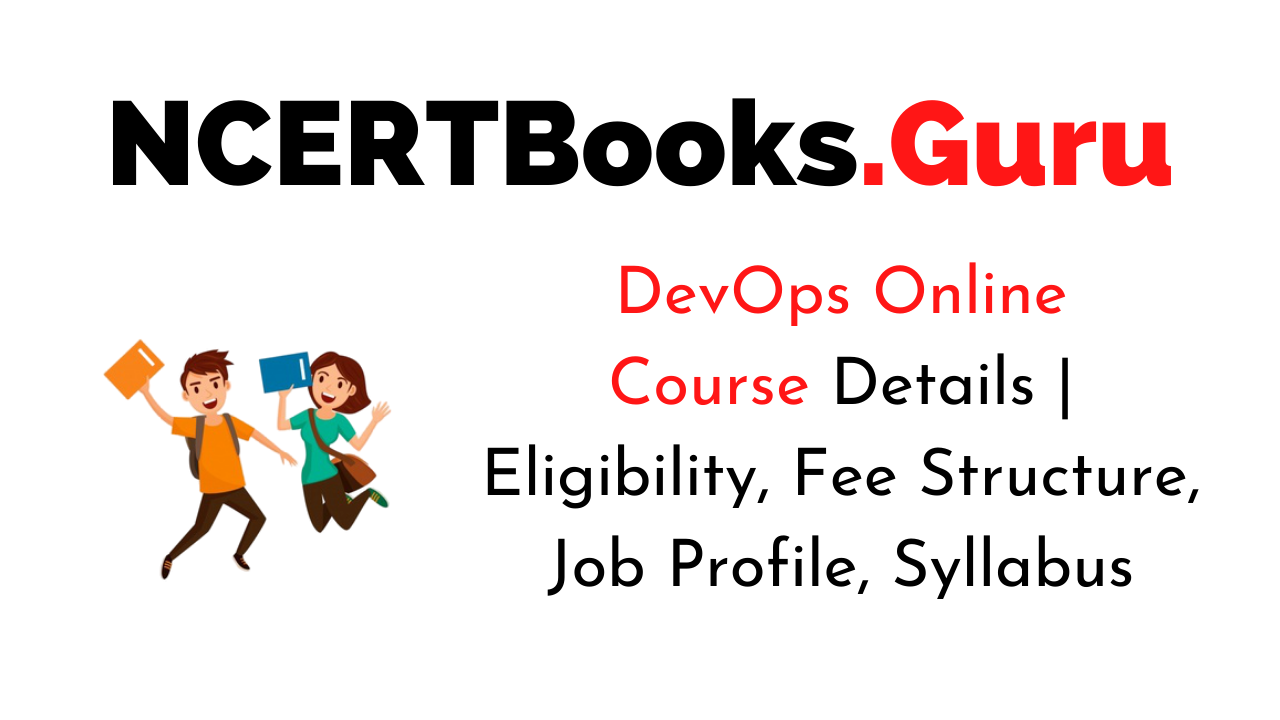DevOps Online Course Details: DevOps is a new term coming from a mixture of two major related trends. The first was called “agile infrastructure” or “agile operations”; it sprang from applying Agile and Lean approaches to operations. The second is a much-expanded understanding of the value of collaboration between development and operations staff throughout all stages of the development lifecycle when creating and operating a service, and how important operations has become in our increasingly service-oriented world (cf. Operations: The New Secret Sauce).
One definition Jez Humble proposed is that DevOps is ” a cross-disciplinary community of practice dedicated to the study of building, evolving and operating rapidly-changing resilient systems at scale.”
Get to Know More about other types of Course Details in Stream wise, and Category wise
Why Should One Take DevOps?
- Shorten Production Cycles: Siloes development and operations teams extend the production cycle unnecessarily. It becomes difficult for both teams to collaborate on the processes required to get the software operational.
- Increase Deployment Success Rates: Programming errors are one of the leading reasons why a deployment fails. The frequent release of code occasioned with the DevOps approach ensures problem detection at an earlier stage.
- Improved Collaboration and Communication: DevOps has revolutionized software development culture. This is because when all stakeholder teams take part in the development process, they focus on a common goal instead of working with different objectives. More synergy improves communication.
- Increased Efficiency Through Automation: Continuous integration reduces manual processes in developing and testing. Specific tasks in the development process cannot be automated. DevOps focusses the developers’developers’ attention on those tasks, leaving the other tasks to tools that can accelerate the development,
- Increase Product Quality: The DevOps process builds quality into the development process, thereby reducing instances of unplanned work. A focus on security during the designing and development stage minimizes the need to remedy security issues later on, thus saving time. And it was freeing more resources to other work.
Details About DevOps Online Courses
You can learn the DevOps course online on different websites. Some popular options are Coursera, SkillShare, etc. Below are the details about different types of online courses available on Skillshare, EDX, Udemy, etc
Continuous Delivery & DevOps
This course is available on Coursera, and it’sits a beginner level course. Bringing an organization to state of the art in this area requires hard work with a combination of disciplines and a combination of both and managerial and technical skills. There is no single cookie-cutter technique for achieving this ability. More like agile, the right focus and formulation depend a lot on the team’s facts and circumstances. This course, evolved at the Darden School of Business at the University of Virginia and taught by top-ranked faculty, will provide you with the skill set to develop a continuous deployment ability in your organization.
Read More: Discipline Paragraph
After completing this course:
- You will be capable to Diagnose a team’steam’s delivery pipeline and bring forward prioritized recommendations to improve it
- You will be able to Explain the skill sets and roles involved in DevOps and how they contribute toward a continuous delivery capability
- You will be able to deliver and review automation tests across the development stack
- You will be able to explain the key jobs of system operations and how today’s leading techniques and tools apply to them
- You will be able to explain how high-functioning teams use DevOps and related methods to reach a continuous delivery capability
- You will be able to facilitate prioritized, iterative team progress on improving a delivery pipeline
Learn DevOps – The Complete Kubernetes Course
This course is available on Udemy in 700 rupees. This course will help you comprehend how to deploy and maintain your applications on Kubernetes. If you are interested DevOps, this is a technology you need to learn. Kubernetes has caught a lot of popularity lately, and it is a well-sought skill by companies. You can containerize applications using Docker. You can then use those containers on your servers, but there’s no chance you can manage those efficiently without extra management software, which is mandatory for you to have. Kubernetes is an orchestrator for the containers that will schedule, create,& manage your containers on a cluster of servers. Kubernetes can run on-premise on a single machine or thousands of machines.
What you’ll Learn in DevOps
- You will be able to install and configure Kubernetes (on your laptop/desktop or production-grade cluster on AWS)
- You will be able to use Docker Client (with Kubernetes), kubeadm, kops, or minikube to setup your cluster
- You will be able to run stateless and stateful applications on Kubernetes
- You will be able to use Healthchecks, Secrets, ConfigMaps, placement strategies using Node/Pod affinity / anti-affinity
- You will be able to use StatefulSets to deploy a Cassandra cluster on Kubernetes
- You will be able to add users, set quotas/limits, do node maintenance, setup monitoring
- You will be able to use Volumes to provide persistence to your containers
- You will be able to scale your apps using metrics
- You will be able to package applications with Helm and write your Helm charts for your applications
- You will be able to automatically build and deploy your own Helm Charts using Jenkins
- You will be able to install and use tubeless to run functions (Serverless) on Kubernetes
- You will be able to install and use Istio to deploy a service mesh on Kubernetes
- You will be able to continuously Develop using Skaffold.
DevOps Online Course Eligibility Criteria
- There is no prior understanding needed, but a dev/ops/Linux/network background will have an edge.
- The course optionally uses Kubernetes on AWS. So you will need to learn it.
DevOps Salaries
According to the salary graph from indeed.com and other such websites, DevOps jobs demand has increased leaps and bounds from 2015. DevOps engineer salaries saw a steep surge in the western countries, showing the demand for professionals.
According to PayScale.com, salaries for DevOps engineering professionals working in western countries are upwards of $93,000. A similar report on payscale.com says that a DevOps engineer in India gets an average salary of 7L. Read more about DevOps Salary in India.
DevOps Career Opportunities
- DevOps Architect: A DevOps architect is accountable for analyzing and executing DevOps practices within the organization. He structures the overall DevOps environment bringing in all efficient DevOps methods as per industry standards. He brings in the correct tools for automation of the processes. He facilitates the development processes and operations of the project. The DevOps architect also makes a continuous build environment to enrich the software development, testing, and the production deployment process.
- Release Manager: In a DevOps environment, the release manager is accountable for planning, monitoring, scheduling, and controlling the software development and deployment process. He makes sure the development team and the operations team to be in sync, ensuring frequent but short feedback loops. This makes the sure faster release of the software. A release manager is hence responsible for defining the acceptance and success criteria for the current build of the software.
- Security Engineer: In the DevOps, world security is mainly known as DevSecOps. The responsibilities include using different tools like log management and configuration management to ensure security throughout. DevOps emphasizes on an ever-evolving security philosophy.
- Automation Engineer: In the DevOps environment, an automation engineer is accountable for maintaining & developing the CI/CD process for all the applications and builds using tools like Jenkins, Maven, Gerrit, Git, etc. He will be automating the configuration management across the platforms and infrastructure using configuration management tools like Chef, Puppet, SaltStack, Fabric, etc.
- Software Tester: A test engineer in the DevOps environment must align their test cases, test design, and test automation with the DevOps being used. A software tester checks that the code changes work as intended and ensure that the changes do not fail the software product. In short, the software tester makes sure that the piece of code meets the success and acceptance criteria put forward by the release manager, as discussed in the above paragraph.
- Integration Specialist: An integration specialist works as the bridge between software development teams and infrastructure operations teams to create the code’s integration and continuity. He creates a holistic view of the working environments. He supports engineering and testing teams to meet infrastructure needs. He also provides some level of support for developed automation.

FAQ’s on DevOps Online Course Details
Question 1.
Is it industry required to pursue this course?
Answer:
No, it’s not mandatory but useful if you have it.
Question 2.
Can I pursuit this course while working for my company?
Answer:
Yes, if you have the time, no one can stop you.
Question 3.
Will there be regular classes for these courses.
Answer:
No, the videos are already uploaded you can watch them at your convenience.
Summary of DevOps Online Course Details
DevOps is one of the most sought after career paths of today. We hope this article has given you enough concepts of DevOps, the DevOps career path and salaries, and the various roles and responsibilities in the DevOps world.
